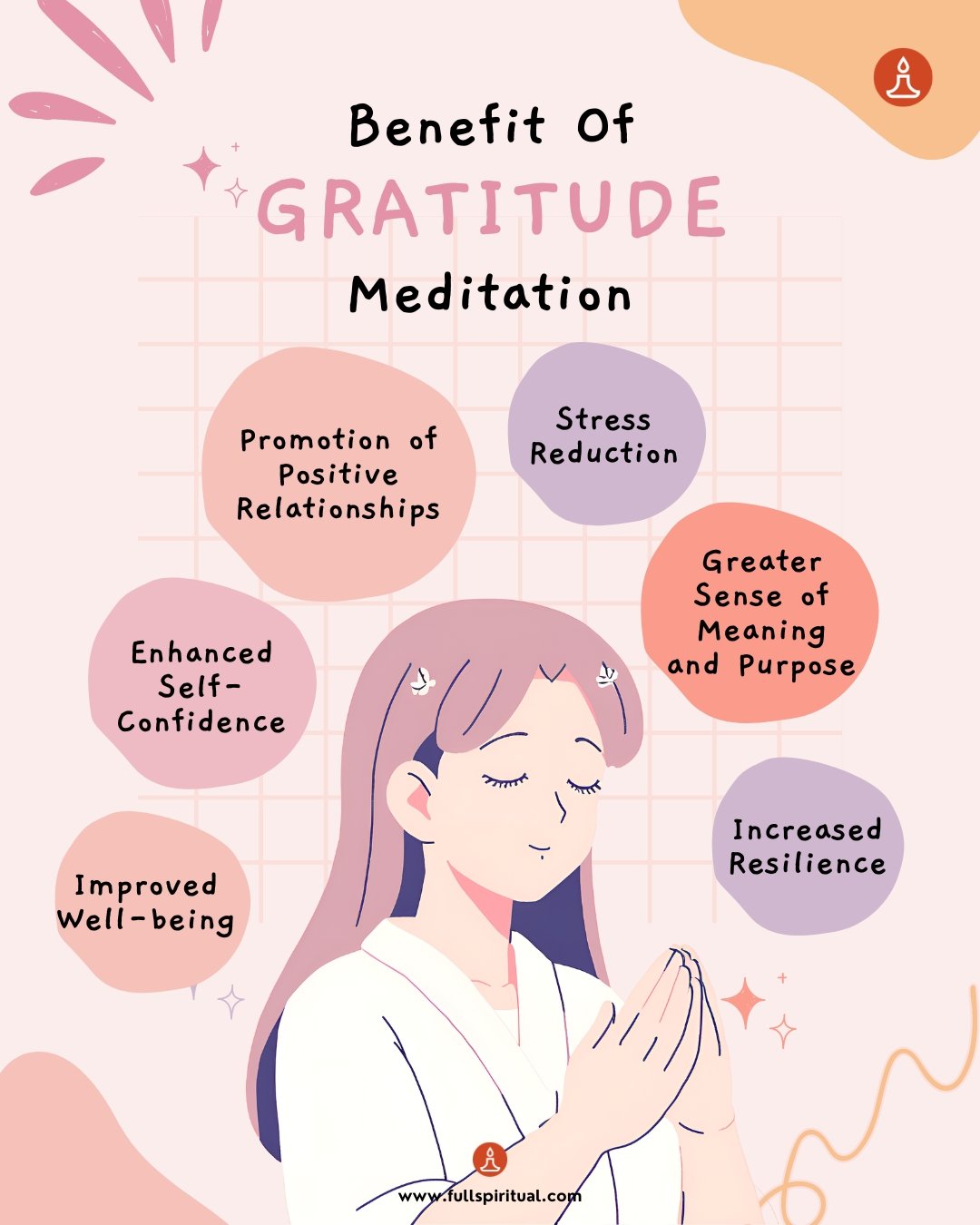Meditation
Discover the Surprising Benefits of Gratitude Meditation – Transform Your Life Today!
For years, I’ve firmly believed in the power of gratitude. Indeed, I’ve become an ardent disciple of this practice – gratitude meditation – and have staunchly defended its efficacy at every turn; however, it remains an elusive goal for me as my life is constantly beset with trials and tribulations.
This morning, I had the opportunity to partake in a gratitude meditation session and was astonished by how invigoratingly rejuvenating this potent technique truly is. Nestled within its simple yet effective exercises lies an array of unexpected benefits accruing over time – from increased positivity to heightened resilience! So why don’t you give gratitude meditation a try today – let’s see what happens!
Table of Contents
What is Gratitude Meditation?

It is a mindful practice that invites individuals to immerse themselves in the present moment, cultivating a profound sense of appreciation for the abundance in their lives. Through guided meditation, practitioners are gently guided to focus their attention on the blessings and joys surrounding them, fostering a heightened awareness of the present moment. By centering their thoughts on gratitude, individuals can transcend past worries and future anxieties, anchoring themselves firmly in the now. In just a few minutes of guided mindfulness meditation on gratitude, one can experience a transformative shift in perspective, realizing that gratitude isn’t merely a response to fortunate circumstances but a conscious choice available in every moment.
When you’re ready to embark on a journey of self-discovery and mindfulness, a minute gratitude meditation can serve as a powerful tool to recalibrate your mindset. As you settle into the practice, allowing yourself to fully embrace the experience of gratitude, you may find that even the smallest gestures or moments evoke a profound sense of appreciation. Through this intentional focus on gratitude and mindfulness, you can nurture a deeper connection to the richness of life, fostering a sense of contentment and peace within yourself. So, whenever you feel the need to reconnect with the essence of gratitude and mindfulness, remember that a minute guided meditation on gratitude awaits, offering a sanctuary of serenity and appreciation amidst life’s bustling chaos.
Though the way you spend time can vary, there are four main components to this method:
1. Take a moment to reflect upon the good things you experience;
2. Write down three things for which you’re grateful;
3. Express these thoughts aloud with enthusiasm; and
4. Rest assured that acknowledging what’s positive does not neglect what’s unpleasant or challenging – rather it ensures that we approach each situation calmly and rationally!
How Does Gratitude Meditation Help You Become More Open-Minded?
If you possess an averse disposition towards new ideas and experiences, it can prove challenging to embrace expansive ones. However, gratitude is a powerful catalyst for opening up your mind – allowing you to overcome the limitations of past situations and envision a more enlightened future!
Honoring your accomplishments or being gratified by the benevolence of others is paramount for creating positive change within your life. By accepting what’s been bestowed upon us along with giving thanks for what we’ve accomplished thus far, we’re able to remain open-minded as we plan our next move – which ultimately leads us to greater levels of contentment.
Not only does gratitude make one more receptive toward new perspectives, but it may also provide the impetus needed to deepen relationships with family members and friends. To be sure, cultivating these ties could prove beneficial in bringing out the best in all parties involved; therefore ensuring that everyone involved benefits from their connections.
By developing an attitude of gratitude toward our lives and surrounding circumstances, we’re rendered more apt at maintaining our equanimity during adversity. Undoubtedly this makes us better equipped to tackle any problem that may arise – demonstrating not only confidence in ourselves but also trustworthiness with regard to those around us.
Why is it so good at doing this?
Gratitude’s impact on reducing impulsivity and suicidal thoughts is a profound aspect of its psychological benefits. Let’s delve deeper into how developing gratitude can lead to such positive outcomes:
- Shift in Focus: When individuals practice gratitude, they consciously shift their focus from what they lack to what they have. This mental shift helps in reducing impulsivity as it encourages individuals to pause and appreciate the positives in their lives rather than acting impulsively on negative emotions or impulses.
- Increased Resilience: Gratitude fosters resilience by helping individuals develop a more positive outlook on life. By acknowledging and appreciating even the smallest blessings, individuals build emotional strength, which can buffer against the challenges and stressors that contribute to impulsive behavior.
- Enhanced Emotional Regulation: Expressing gratitude activates neural pathways associated with the regulation of emotions. As individuals consistently practice this technique, they become better equipped to manage and regulate their emotions, reducing the likelihood of impulsive actions driven by intense or overwhelming feelings.
- Sense of Purpose and Meaning: Gratitude encourages individuals to reflect on the meaningful aspects of their lives, fostering a sense of purpose and connection to something greater than themselves. This sense of purpose can serve as a protective factor against suicidal thoughts by providing individuals with a reason to persevere through difficult times.
- Social Support and Connection: Gratitude promotes social connection by fostering feelings of appreciation and reciprocity in relationships. As individuals express gratitude towards others, they strengthen social bonds and build a support network, which can provide valuable assistance and encouragement during times of distress or vulnerability.
- Reduced Rumination: Gratitude practice interrupts rumination—the repetitive and negative thought patterns associated with depression and suicidal ideation. By focusing on positive aspects of life, individuals are less likely to dwell on negative thoughts or past experiences that contribute to feelings of hopelessness or despair.
- Increased Dopamine and Serotonin Levels: Gratitude has been associated with increased levels of dopamine and serotonin, neurotransmitters that play key roles in regulating mood and emotions. Higher levels of these neurotransmitters are linked to improved mood, reduced impulsivity, and a decreased risk of suicidal ideation.
Overall, by fostering a mindset of gratitude, individuals can experience profound psychological benefits that not only enhance their well-being but also serve as protective factors against impulsive behavior and suicidal thoughts. Nurturing gratitude is a powerful tool for promoting mental health and resilience in both individuals and society as a whole.

What are the benefits of gratitude meditation?
In the past decade, gratitude has emerged as a more prominent priority in our daily lives. Even so-called ‘gratitude researchers’ acknowledge its prominence: psychologist Robert Emmons found that 89% of those surveyed listed it among their most meaningful life experiences!
Indeed, there are countless benefits attributable to this tenacious practice; these include alleviating stress, improving well-being, and fostering self-confidence. Moreover, thanks to recent research conducted by Harvard Business Review on the subject matter – which revealed that regular meditation sessions may result in improved productivity – it’s a practice worth considering for any individual seeking success in all aspects of life!
Here are just some of the advantages of practicing gratitude:
- Stress Reduction: This meditation encourages individuals to focus on positive aspects of their lives, which can counteract the effects of stress and promote relaxation. By shifting attention away from worries and anxieties, individuals experience a sense of calm and tranquility.
- Improved Well-being: It is associated with increased levels of subjective well-being and life satisfaction. By acknowledging and appreciating the abundance in one’s life, individuals nurture a more positive outlook, leading to greater overall happiness and fulfillment.
- Enhanced Self-Confidence: This encourages individuals to recognize their strengths and accomplishments, fostering a sense of self-worth and confidence. By focusing on what they are grateful for, individuals develop a deeper appreciation for themselves and their abilities, which can boost self-esteem.
- Promotion of Positive Relationships: This strengthens social bonds by encouraging individuals to express appreciation towards others. By fostering feelings of gratitude and reciprocity in relationships, individuals deepen their connections with others and build a supportive network of friends and loved ones.
- Increased Resilience: This builds emotional resilience by helping individuals cope with adversity and setbacks. By focusing on the positive aspects of life, individuals develop a mindset of gratitude that enables them to navigate challenges with greater ease and optimism.
- Enhanced Emotional Regulation: It trains individuals to regulate their emotions by nurturing a mindset of appreciation and acceptance. By practicing gratitude regularly, individuals become more adept at managing negative emotions and responding to stressful situations in a calm and constructive manner.
- Improved Physical Health: Research suggests that this meditation may have positive effects on physical health, including reduced inflammation, improved immune function, and lower blood pressure. By promoting relaxation and reducing stress, which contributes to overall well-being and longevity.
- Greater Sense of Meaning and Purpose: It encourages individuals to reflect on the meaningful aspects of their lives, leading to a deeper sense of purpose and direction. By connecting with what they are grateful for, individuals gain clarity about their values and priorities, guiding them toward a more fulfilling and meaningful life.
Overall, gratitude meditation offers a wide range of benefits that encompass both mental and physical well-being. By incorporating this practice into daily life, individuals can experience profound positive changes that enhance their quality of life and contribute to long-term happiness and success.

Are there any side effects to gratitude meditation?
Before delving into scientific research, it’s important to be aware that gratitude can be a highly effective tool for improving our lives. However, like any other endeavor, there are potential drawbacks associated with this practice as well.
After all, every virtue possesses its own unique flavor and positive aspects do not outweigh its potential pitfalls. For instance, being grateful does little good when we cannot adequately express our appreciation for people or circumstances; consequently, no amount of gratitude could make up for such shortcomings.
Although some preliminary research has demonstrated the adverse effects of gratitude on psychological health, a comprehensive study found that no significant differences were discernible between individuals who participated in the act versus those who did not.
For example, individuals who reported practicing gratitude tended to be more serene than their peers without it. Conversely, they experienced fewer stress symptoms than those without this practice – suggesting that perhaps calling upon one’s inner calmness may prove beneficial after all!
Conclusion
It is a powerful practice that can transform your life by fostering a sense of gratitude, mindfulness, and open-mindedness. By regularly practicing gratitude meditation, you can experience a range of benefits, including increased happiness, resilience, and connection with others. This practice offers a simple yet profound way to cultivate gratitude in your daily life and experience a greater sense of well-being. Engaging in a regular mindfulness practice can significantly enhance mental clarity and emotional well-being.
Whether through guided gratitude meditation sessions, keeping a gratitude journal, or reflecting on the things you’re grateful for, incorporating gratitude practice into your routine can have lasting effects on your mental, emotional, and physical health. Embrace the attitude of gratitude and explore the transformative potential of gratitude meditation in enhancing your overall quality of life.

